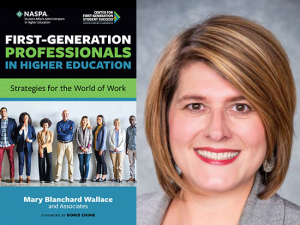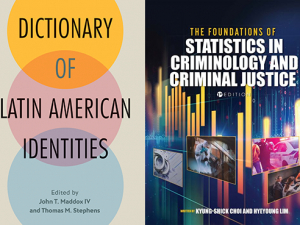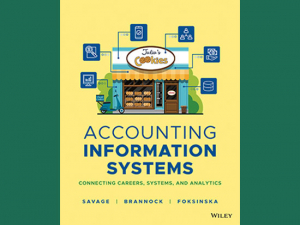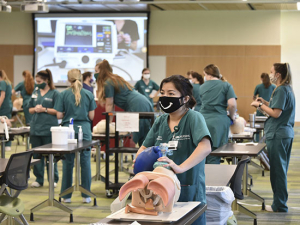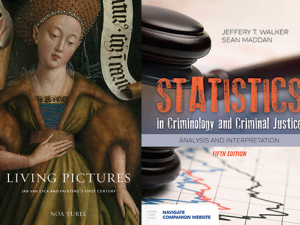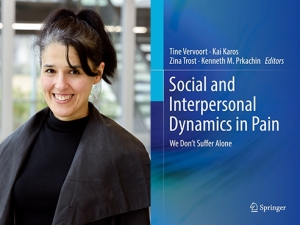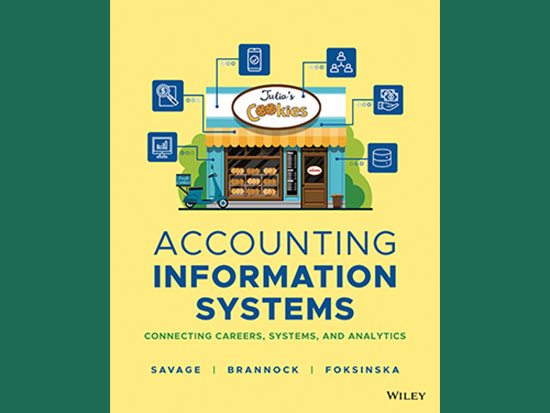 Written by a UAB accounting professor and two alums, Accounting Information Systems illustrates how practitioners use data and analytics in today's job market.There are things you need to know in order to get an accounting degree and things you need to know in order to be a successful accountant, and those mostly overlap. But there are some crucial areas where recent graduates struggle as they enter the workforce.
Written by a UAB accounting professor and two alums, Accounting Information Systems illustrates how practitioners use data and analytics in today's job market.There are things you need to know in order to get an accounting degree and things you need to know in order to be a successful accountant, and those mostly overlap. But there are some crucial areas where recent graduates struggle as they enter the workforce.
As computer systems have grown and become more interconnected, accountants have a window into all aspects of a business, giving them the ability to identify trends and outliers in near real time in order to spot fraudulent activity, improve business processes or take advantage of new business opportunities. This makes an understanding of accounting information systems, or AIS, critical to career success.
As mid-level accounting professionals, Danielle Brannock and Alicja Foksinska are involved in many interviews, either for their own teams or for other positions in their companies. Foksinska, who is lead IT auditor at Birmingham-based Protective Life Corporation, has seen the need for data analysis and storytelling skills continually expand through her seven years at the company. She compares the data in Protective’s systems to an iceberg. “With every year, we unfreeze more of that data,” she said. “We start learning how to make unstructured data structured, where we can get insights from it.”
"Missing key knowledge"
“We have a strong pain point of hiring accounting graduates and they have skill gaps where they are missing key knowledge related to data analytics, information systems and how the technology within a business connects to facilitate how a company operates,” said Brannock, who is an internal audit data analytics specialist at Intuitive Surgical in Atlanta.
“Well over 150 students have used the book and learned from it. These are professionals who are already working as accountants and want to grow in their careers, or current professionals who want to start a career in the accounting field. They tell us, ‘I just read about this in the book, and I could apply it in my job.’ That is great to hear.”
That is something that has bothered Arline Savage, Ph.D., professor of accounting in the Collat School of Business, as well. “In the many years that I have been teaching AIS, I have noticed that my students often do not see the connection between AIS and their other accounting courses,” Savage said. “Many years later, I’ll get an email from a student saying, ‘Now I see why what you taught me was so important, because I’m using it at work every day.’”
Savage, who has been teaching AIS since 1998, was already an author on a respected AIS text from Wiley, now in its 14th edition. But when the publisher decided to start fresh and asked Savage to be lead author, she opted to work with two practitioners and former students, Brannock and Foksinska, rather than other academics, as is the usual practice.
Accounting Information Systems: Connecting Careers, Systems and Analytics, by Savage, Brannock and Foksinska, was published in early 2022 by Wiley. The emphasis on real-world, hands-on learning, a hallmark and emphasis of the Collat School of Business, is evident throughout. All three authors drew from their extensive networks of accounting professionals to provide current examples and insights throughout the book on how the material covered relates to a range of accounting careers. Another distinguishing feature: The author team of three women accountants and information systems experts stands out. Diversity and inclusion also is a major emphasis of the text, the authors say. That is reflected in the experiences and backgrounds of professionals highlighted in the text and in the names and pronouns used in its exercises. The colors used are Americans with Disabilities Act-compliant, and the icons and other graphics used in the digital components are tagged with speech descriptions so they are accessible for users of all vision levels.
 Left to right: Authors Arline Savage, Ph.D., Danielle Brannock and Alicja Foksinska.
Left to right: Authors Arline Savage, Ph.D., Danielle Brannock and Alicja Foksinska.
Sweet startup
The text is built around the evolving business needs of a startup company, Julia’s Cookies, and tracks how accounting information systems mature and change with the firm’s expansion. Most chapters end with assignments that challenge students to apply the knowledge in Tableau, a leading data analysis software that is widely used in the business world. Data and background materials for these assignments are downloadable from the product’s website, as are video interviews with professionals in various job roles. (Many of these are successful UAB alumni.)
Both Brannock and Foksinska graduated from UAB in 2015. Since 2020, Foksinska also has been a credentialed course instructor at the Collat School of Business. Starting in the spring 2021 semester, Foksinska and Savage have been using the new text in their online AC304 Accounting Information Systems course. The class is part of Collat’s undergraduate accounting program and accounting bridge certificate program that prepares students who do not already have a bachelor’s degree in accounting for the master of accounting (MAc) program.
“Well over 150 students have used the book and learned from it,” Foksinska said. “These are professionals who are already working as accountants and want to grow in their careers, or current professionals who want to start a career in the accounting field. They tell us, ‘I just read about this in the book, and I could apply it in my job.’ That is great to hear.”
“A lot of professors talk about having a challenge in implementing data analytics in the classroom because they are not familiar with the current tools and software we are using in the industry,” Brannock said. “So we have embedded tool-agnostic data analytic problems within this product so that students are learning the foundations and fundamentals of data, data storage and data analysis without ever having to open a software, making this easy for professors to teach and also grade.” Students can use these projects as portfolio pieces when they apply for jobs, Foksinska adds.
“My teaching philosophy is learning by doing and engaging my students in lots of discussions,” Savage said. “Our book helps do that. There is hands-on, active learning throughout the book.”
Related: Students get hands-on experience with Magic City Data Collective
Data analysis skills are crucial to jobs across the economy, not just accounting. The Magic City Data Collective, a pilot project of UAB, the Birmingham Business Alliance and the Birmingham Education Foundation, provides UAB students paid internship opportunities to grow their data analysis skills while working with local private-sector employers such as Protective Life Corporation. Alicja Foksinska took part as a senior data fellow, working with another Protective employee/senior data fellow and a team of UAB students who took on a data-intensive project for the company’s Protective Life Foundation.
“The students used real data on a real project with a real stakeholder at the end — the executive director of the Protective Life Foundation, Eva Robertson,” Foksinska said. “She was interested in insights on data that went back to 1992. The students were able to calculate the value of the foundation’s impact on the community over that span, how much they had allocated toward different causes, which were their longest partner relationships and other patterns. They learned how to take raw data, clean it and structure it, putting in about 20 hours per week.”
The students also gathered their own third-party data by creating a survey for their peers around Birmingham, “getting their thoughts on what a Generation Z population values as it relates to a company’s social impact when entering the workforce, compared with a company’s benefits and perks,” Foksinska said. “We got some very interesting insights, and the students are able to put that on their resume and use it as an example of their work when they apply for jobs.”


